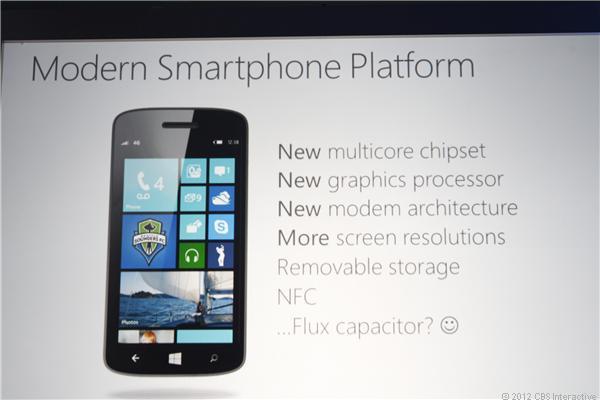Windows Phone 8 details revealed: No upgrade for Mango phones

Microsoft has given more details on Windows Phone 8, a major update to its phone OS that makes it easier for developers to port apps between desktop and mobile Windows.

Windows Phone 8 will come with multicore support, NFC and a digital wallet, Microsoft has announced. Image credit: Josh Miller/CNET News
Windows Phone 8, code-named Apollo, will have a "common core" with desktop Windows, Microsoft said at a Windows Phone Summit event in San Francisco on Wednesday. This means it will use significant components of the desktop Windows 8, including the Windows NT kernel.
"With Windows Phone 7, there was one thing we couldn't change: the core technology was based on Windows CE," Joe Belfiore, Microsoft's manager for Windows Phone. "We could benefit from a change of core."
Among the details revealed on Wednesday is that Apollo will bring Windows Phone support for handsets with multicore chips. It also adds support for higher screen resolutions, covering 1280x720-pixel displays with a 16:9 aspect ratio and 1280x768-pixel displays with a 15:9 ratio.
Other new features include SD card storage, the addition of near-field communications (NFC) payment tools and a secure digital wallet. Microsoft's lead partner for NFC and its digital wallet is Orange, which will launch devices with secure SIM cards. New in-app purchases tied to the wallet will let users bypass the Windows Phone Marketplace.
Users will get a more customisable start screen, with a choice of three sizes of Metro Live Tile and new theme colours. Windows Phone 8 will also use the same Internet Explorer 10 browser as Windows 8, and will replace Bing Maps with Nokia's mapping technology, giving it offline mapping and turn-by-turn directions.
Describing Wednesday's event as a "sneak peek", Microsoft did not reveal the entire Windows Phone 8 feature set nor discuss the hardware requirements for devices. Instead it focused on the benefits to the Windows Phone ecosystem and to developers of improved links to its much larger and more mature PC ecosystem.
However, the company did say that Windows Phone 8 will not run on current Windows Phone devices, due to hardware limitations. Instead, Windows Phone 7 users will be able to upgrade to a new point release, Windows Phone 7.8. This will have some of Windows Phone 8's new user interface features, but will be built on the existing Windows Phone 7 kernel and will not be able to run Windows Phone 8 applications. Existing Windows Phone 7 applications will run on Windows Phone 8.
Porting applications
The 'common core' does not mean Windows developers will be able to run existing Windows desktop applications on a phone, Microsoft also pointed out. However, it does mean it will be a lot easier to port applications from one platform to the other.
Applications will be able to use common system APIs, such as those for file system and networking, and developers will be able to share code components between the two platforms or use the same device drivers. Phone and PC will keep separate user interfaces, as well as different multi-tasking models, while both will use Microsoft's Visual Studio 2012 development tools.
Microsoft is giving developers the ability to write native code applications in C++ in addition to the current Silverlight-based managed code environment. New functions will allow VoIP applications to run in the background, allowing messaging and app-to-app calling. Native applications will not have complete access to the phone hardware, and will run isolated from each other using similar sandboxing techniques to those used by Windows 8's Windows RT programming model.
The upcoming mobile OS is "enterprise ready", Microsoft said. New management tools and features include support for secure disk encryption and for controlled distribution of enterprise software applications. There will also be support for device management tools, with a set of APIs to handle integration with both Microsoft's and third-party software.
Windows Phone 8 and Windows Phone 7.8 will be available sometime in the autumn, with developer tools and documentation to be released over the summer.